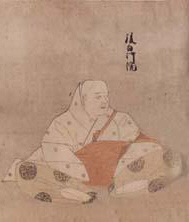Go-Shirakawa
Go-Shirakawa ( Japanese 後 白河 天皇 , Go-Shirakawa-tennō ; * October 18, 1127 in Kyoto ; † April 26, 1192 ibid) was the 77th Tennō of Japan (August 23, 1155– September 5, 1158). His proper name was Masahito ( 雅 仁 ). After his reign he was called Go-Shirakawa-in ( 後 白河 院 ) or Go-Shirakawa Hōō ( 後 白河 法 皇 ).
He was a son of Toba- tennō and father of Tennō Nijō and Takakura . The Tennō Rokujō , Antoku and Go-Toba were his grandchildren. His father Toba founded the monastery rule. After Toba-tennō's death in 1156, Go-Shirakawa and his brother Sutoku quarreled over the continuation of the influence of the former rulers who had retired into the monastery ( Insi system) and the control of the Fujiwara family over the reign. Both parties campaigned for the support of the important samurai families of the Minamoto and Taira . Sutoku began the Hōgen rebellion ( 保 元 の 乱 , Hōgen no ran ) in the same year , which ended after heavy fighting with his defeat. Sutoku's allies Fujiwara no Yorinaga , Minamoto no Tameyoshi and Taira no Tadamasa were killed. Minamoto no Tametomo survived the battlefield and was forced to flee. Minamoto no Yoshitomo became head of the Minamoto after the death of his father and, together with Taira no Kiyomori, established these two samurai families as significant new political forces in Kyoto.
Go-Shirakawa remained the victor in this war. Even after he handed over the throne to his son Nijō in 1158 , he remained the de facto ruler. He ruled the monastery ( insei ) until his death in 1192.
Web links
Individual evidence
| predecessor | Office | successor |
|---|---|---|
| Konoe |
Tennō 1155-1158 |
Nijō |
| personal data | |
|---|---|
| SURNAME | Go-Shirakawa |
| ALTERNATIVE NAMES | Goshirakawa; 後 白河 天皇 (Japanese); Masahito (proper name) |
| BRIEF DESCRIPTION | 77th Tennō of Japan (1155–1158) |
| DATE OF BIRTH | October 18, 1127 |
| PLACE OF BIRTH | Kyoto |
| DATE OF DEATH | April 26, 1192 |
| Place of death | Kyoto |
